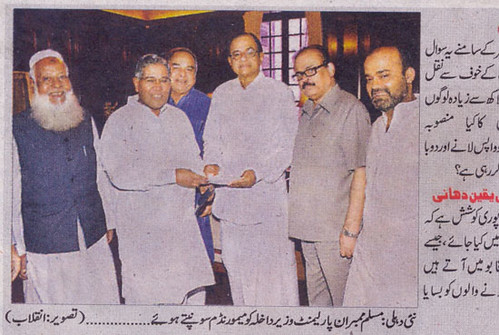By Mohammad Zeyaul Haque,
The author looks at the variety and veracity of Indian Muslim leadership in the context of the latest bout of ethnic cleansing in Assam
Last week, when the newspapers were full of reports of mass violence, arson and ethnic cleansing in Kokrajhar and adjoining areas in Assam, this writer got up one morning to be confronted by a strange, weird picture in one of the Urdu dailies. Five Muslim politicians, standing around the then Union Home Minister P Chidambram, were having a mighty, synchronised laugh as the minister looked on with the usual unsmiling, grim expression on his face.
The laughter looked so bizarre and out of sync with the sentiment of the moment (the growing concern in the Indian Muslim community over mass killing of fellow Muslims in Assam had, at least temporarily, excluded all thoughts of rejoicing from their lives) that one got curious to know what was going on.

The caption said “A delegation of Muslim MPs meeting P. Chidambram” to demand action in Assam. The delegation was led by Mr K Rahman Khan, former deputy chairman of Rajya Sabha, and the other worthies were Mr Mohammad Adeeb, Maulana Asrarul Haq Qasmi, Mr Tariq Anwar, and Mr Sabir Ali, all MPs. One wondered what was the reason for such unrestrained merriment? Is it mandatory for everyone meeting a cabinet minister to bare all his teeth to the camera? Even in such a dark moment? The only other reason for laughter could be their sense of satisfaction and achievement at meeting Mr Chidambram. Is merely meeting the minister over a cup of tea such a great idea? Alternately, is the murder of a hundred people and the displacement of a couple of hundred thousand scurrying for cover all over the place such a funny idea?
The lone person left with any sense of dignity in the picture is Mr Chidambram, who does not seem to think that Assam on fire is such great fun. So, this is the collective face of one section of our leaders: laughing boisterously when the rest of us are weeping. Don’t pay too much heed to them when Muslim leaders tell you that Prime Minister Manmohan Singh visited Assam on their advice, or Mrs Sonia Gandhi was persuaded by them to ask the Centre to act and the Centre acted. Every section of our Delhi-based leadership claims a special almost exclusive, one-to-one relationship with Mrs Gandhi and Mr Singh down to everybody in Delhi who is anybody at all. Lesson number one: Our tears bring laughter to some of our leaders. Lesson number two: Don’t believe the tall claims of leaders given to bragging.
Another class of Muslim leaders was as much visible this time as they are at other moments of great turmoil and sorrow. These fellows are found in abundance in Delhi. Their specialisation: they shoot off press notes to Urdu newspapers the moment they see something going wrong being reported by TV. This is all they are good for, our great press-note leaders. It is better to leave them to their own devices. Now, lesson number three: Don’t expect anything from this class as it is too busy preparing press notes.
We have another class of leaders who act, who have acted in the past, will do so in future. We are lucky to have them. Although there are a reasonably good number of them around, God be thanked for this special act of kindness of His, one would like to mention only a few of them, in the interest of brevity.
In this class we have the Madanis – Maulana Mahmood and Maulana Arshad – Mr Asaduddin Owaisi and Maulana Badruddin Ajmal. The last two also happen to be MPs, Mr Owaisi from MIM and Maulana Ajmal from AUDF. Their response to the massive violence in Assam was a little low key and appropriate. They went to Assam (Maulana Ajmal is from Assam and his AUDF has 18 MLAs in the Assembly), met the Prime Minister at Guwahati airport and apprised him of the exact situation, asking him to focus on the humanitarian catastrophe. They also committed substantial funds for relief and rehabilitation from their own personal and organisational resources. Now, lesson number four: Support leaders who act, not those who get photographed and issue press notes.
Other kinds of leaders will tell you that Maulana Ajmal is in any case an Assamese and the Madanis have a big support base in Bihar, Assam, West Bengal and Bangladesh since the time of Maulana Arshad’s father and Maulana Mahmood’s grandfather, Maulana Husain Ahmad Madani. Don’t pay heed to them. Instead, ask them if the Madanis, along with Maulana Ajmal are only cultivating constituencies of one kind or other, what is Mr Owaisi doing there? After all, his constituency is the distant Hyderabad, not Kokrajher.
This is not to deny the value of the work of a lot of local volunteers, grassroots leaders of local organisations, or functionaries of local units of national level organisations. Hats off to them. May Allah bless and accept their services. It is not they who have let us down repeatedly, but the power-peddling duniya talab fellows sitting in Delhi.
A favourable mention also must be made of those people from Delhi who have honestly tried to help by visiting the victims in their inadequate camps, knowing their condition first hand, mobilising resources on their own and co-ordinating with the local people. Among those are Dr Zafarul Islam Khan of Majlis-e-Mushawarat, Mr Navid Hamid of MOEMIN and Dr Tasleem Rahmani of Muslim Political Council.
A friend in need is a friend indeed. A leader is tested in moments of crisis. Leaders who act are leaders. “Leaders” who look for photo ops and opportunity to release press notes are charlatans.
